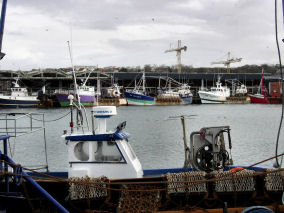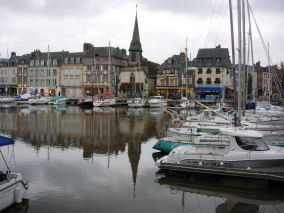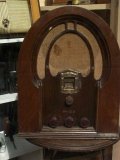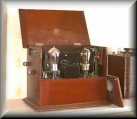STUDENT - INTRODUCTION
See THREE PHASES OF PRODUCTION
See Radio Drama Theory Lesson Plan

STARTING A PRODUCTION AND CHOOSING A SCRIPT?
Stage play adaptation? - NO (probably)
Short story adaptation - YES (especially sci-fi, horror, fantasy)
SCRIPTING YOURSELF? Good!
Radio soap (serial drama)? Good!
Experimental? Good
| ADAPTATIONS OF STAGE PLAYS? I advise NO. Stage play scenes have a different tempo, they are not suited to student productions, and not to student actors' abilities. You could be making the project too difficult for yourself and the team. Remember that the microphone is cruel and your listeners can be turned off by one sentence or one actor. On the other hand, if you are creatively excited by a stage script, who am I to stand in your way?! |
|
ADAPTATION OF A SHORT STORY? Good! This puts you in charge. And especially if the genre is NOT realism, but sci-fi, thriller, fantasy, horror etc. Use a narrator. See Types of plays. See Adaptations for some suggested texts. See Types of plays - and suggestions for productions |
|
NOW - make a storyboard. This will put you right away in a creatively efficient direction. You work for the result, for the broadcast production. Often in radio, you need to work back-to-front, planning for each minute of the product.See Copyright. |
|
SCRIPTING YOURSELF? Good! You will be even more creatively committed to the project. STUDY radio drama techniques (from this site etc.). Short scenes. |
|
Radio soap (serial drama)? Good! See Soap Project
|
|
What post-production resources do you have? Working as a student, there will often be restrictions. So planning ahead is crucial and casting is crucial. You can save a lot of time in post-production if you have cast well and prepared your actors.
|
|
You will save time if you choose your range of pre-recorded sound effects early, and BEFORE you go into the studio with your actors. Ditto your choices of music. AND YOU MUST PREPARE YOUR SCRIPT AND ALL YOUR CHOICES AS DIRECTOR, AND ALL POSSIBLE CHOICES FOR YOUR ACTORS. |
| I prefer to work with a lot of post-production if on non-realist genres and if the style is filmic - see Filmic - styles of radio drama directing and post-production which creatively relate to film |
| There are SOME BASICS of studio production and post-production you have to learn - quickly. They are set out below on this web page. Fast-track through these and then go over them again. |
| Are you aware of the full range of possibilities? Use the list below as a check list. |
| Now go to THREE PHASES OF PRODUCTION |
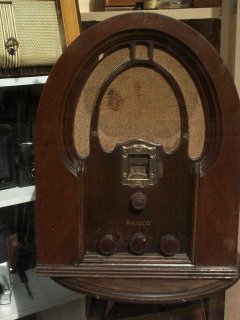
GET INTO RADIO DIRECTING TECHNIQUES
|
|
|
|
|
|
|
|
| establish presence |
|
|
|
|
|
|
|
|
|
|
|
|
|
|
|
|
|
|
|
|
|
|
|
|
|
|
|
|
|
|
|
'moving camera' technique |
|
|
|
'Will you turn that music down!' |
|
|
|
|
|
|
voice in the mind = interiorizing |
|
Styles of production, directing and post-production
|
|
|
|
|
|
|
|
|
|

|
|
|
|
| Marking criteria |
| BBC Editorial Guidelines - links and excerpts |

| Level One: Your first script: 'The Ark' production and script for seven actors and seven production team |
| Level Two: Your second Script: 'The Ouija Board' |
| Level Three: Acting : objective-choice-action |
| Acting : some key terms for the actor and director |
| Level Four: Creative scripting and production exercises - hook and signposting, & montage, & music |
| Level Five: How to produce a TRAIL - What is signposting? & Some advice about radio drama directing as a student |
Level Six
|
|
|
|
| Level Seven : Script: 'We Go With' |
Level Eight
| Scripts: Dragon |
| Colourlands |
| The Egg-stremists |
| Warm Up Act |

Theoretical issues & writing-up your project
|
|
|
|
| language based = logocentric |
|
|
|
|
To Index 'A' to 'Z' for this site - use to navigate
Now go to THREE PHASES OF PRODUCTION
|
|
